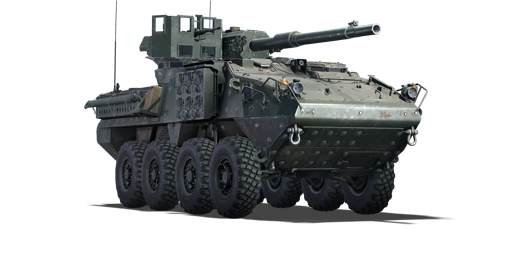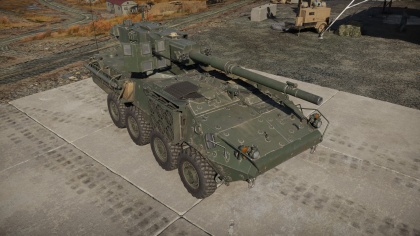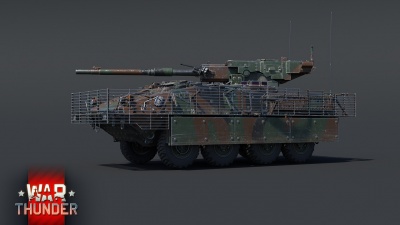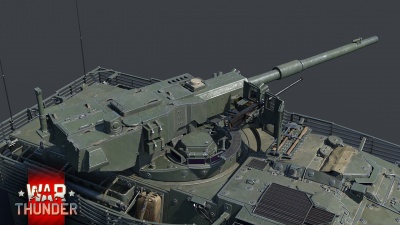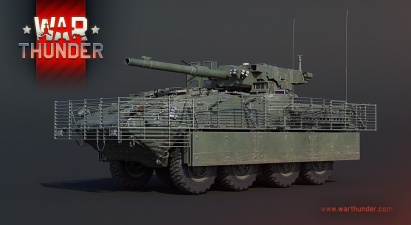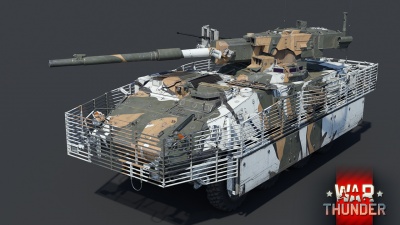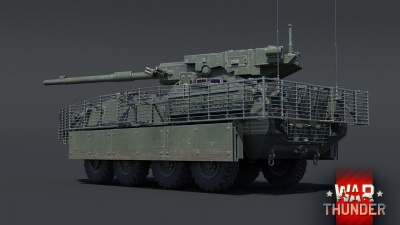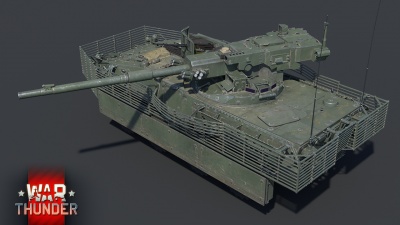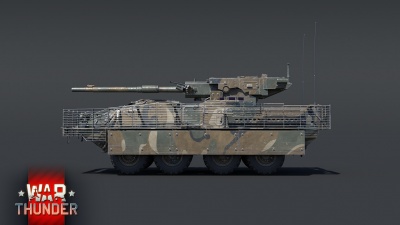Difference between revisions of "M1128"
(→From Devblog:) (Tag: Visual edit) |
(→Media) |
||
| Line 304: | Line 304: | ||
== Media == | == Media == | ||
| − | <!-- ''Excellent additions to the article would be video guides, screenshots from the game, and photos.'' --><gallery mode="packed" caption="M1128 Stryker MGS Devblog Images" heights=" | + | <!-- ''Excellent additions to the article would be video guides, screenshots from the game, and photos.'' --><gallery mode="packed" caption="M1128 Stryker MGS Devblog Images" heights="150"> |
File:M1128 Stryker MGS WTWallpaper 001.jpg| | File:M1128 Stryker MGS WTWallpaper 001.jpg| | ||
File:M1128 Stryker MGS WTWallpaper 002.jpg| | File:M1128 Stryker MGS WTWallpaper 002.jpg| | ||
Revision as of 07:47, 2 December 2020
Contents
Description
The M1128 is a rank American tank destroyer
with a battle rating of (AB), (RB), and (SB). It was introduced in Update "New Power".
General info
Survivability and armour
Armour type:
- High Hardness Rolled Armor - Hull and turret
- MEXAS 2C - Applique armor on hull and lower turret
| Armour | Front (Slope angle) | Sides | Rear | Roof |
|---|---|---|---|---|
| Hull | 12.7 mm (70°) + 25.4 mm MEXAS 2C Upper Glacis 12.7 mm (1°-3°) + 25.4 mm MEXAS 2C Middle Plate 12.7 mm (54°) + 25.4 mm MEXAS 2C Lower Glacis |
12.7 mm + 25.4 mm MEXAS 2C | 12.7 mm + 25.4 mm MEXAS 2C Door 12.7 mm Hull Rear |
12.7 mm + 25.4 mm MEXAS 2C |
| Turret | 12.7 mm Upper Part 12.7 mm + 25.4 mm MEXAS 2C Lower Part |
12.7 mm Upper Part 12.7 mm + 25.4 mm MEXAS 2C Lower Part |
12.7 mm Upper Part 12.7 mm + 25.4 mm MEXAS 2C Lower Part |
12.7 mm - 15 mm Upper Part 12.7 mm + 25.4 mm MEXAS 2C Lower Part |
| Cupolas | 12.7 mm | 12.7 mm | 12.7 mm | 12.7 mm |
Notes:
- .50 cal machine gun shield has 12.7 mm of armor protection.
- Wheels provide 10 mm of protection.
- Vehicle is vulnerable to hull break.
Additional Armor
| Armour | Location |
|---|---|
| Spaced Armor | Between engine compartment and the crew compartment
Between hull front and driver |
| Slat Armor | All four sides of the hull |
| Sideskirts | Over the wheels |
- Sideskirts: 6.35 mm High Hardness Rolled Armor + 6.35 mm High Hardness Rolled Armor + 50 mm Composite Screen
- Spaced Armor: 5 mm Rolled Homogeneous Armor
- Slat Armor: 10 mm
Mobility
| Game Mode | Max Speed (km/h) | Weight (tons) | Engine power (horsepower) | Power-to-weight ratio (hp/ton) | |||
|---|---|---|---|---|---|---|---|
| Forward | Reverse | Stock | Upgraded | Stock | Upgraded | ||
| Arcade | Expression error: Unexpected * operator. | 497 | Expression error: Unexpected round operator. | __.__ | |||
| Realistic | 310 | Expression error: Unexpected round operator. | __.__ | ||||
Armaments
Main armament
Give the reader information about the characteristics of the main gun. Assess its effectiveness in a battle based on the reloading speed, ballistics and the power of shells. Do not forget about the flexibility of the fire, that is how quickly the cannon can be aimed at the target, open fire on it and aim at another enemy. Add a link to the main article on the gun: {{main|Name of the weapon}}. Describe in general terms the ammunition available for the main gun. Give advice on how to use them and how to fill the ammunition storage.
| 105 mm M68A1E8 | Turret rotation speed (°/s) | Reloading rate (seconds) | |||||||||||
|---|---|---|---|---|---|---|---|---|---|---|---|---|---|
| Mode | Capacity | Vertical | Horizontal | Stabilizer | Stock | Upgraded | Full | Expert | Aced | Stock | Full | Expert | Aced |
| Arcade | 18 | -5°/+15° | ±180° | Two-plane | __._ | __._ | __._ | __._ | __._ | 10.00 | 10.00 | 10.00 | 10.00 |
| Realistic | __._ | __._ | __._ | __._ | __._ | ||||||||
Ammunition
| Penetration statistics | |||||||
|---|---|---|---|---|---|---|---|
| Ammunition | Type of warhead |
Penetration @ 0° Angle of Attack (mm) | |||||
| 10 m | 100 m | 500 m | 1,000 m | 1,500 m | 2,000 m | ||
| M456A2 | HEATFS | 400 | 400 | 400 | 400 | 400 | 400 |
| C76A1 | APFSDS | 334 | 330 | 323 | 314 | 306 | 297 |
| M900 | APFSDS | 522 | 519 | 513 | 504 | 495 | 486 |
| Shell details | |||||||||
|---|---|---|---|---|---|---|---|---|---|
| Ammunition | Type of warhead |
Velocity (m/s) |
Projectile Mass (kg) |
Fuse delay (m) |
Fuse sensitivity (mm) |
Explosive Mass (TNT equivalent) (g) |
Ricochet | ||
| 0% | 50% | 100% | |||||||
| M456A2 | HEATFS | 1173 | 10.50 | 0.05 | 0.1 | 1270 | 65° | 72° | 77° |
| C76A1 | APFSDS | 1509 | 3.60 | N/A | N/A | N/A | 78° | 80° | 81° |
| M900 | APFSDS | 1505 | 3.85 | N/A | N/A | N/A | 78° | 80° | 81° |
Ammo racks
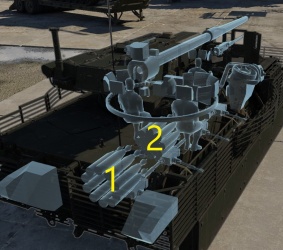
| Full ammo |
1st rack empty |
2nd rack empty |
Visual discrepancy |
|---|---|---|---|
| 18 | 9 (+9) | 1 (+17) | No |
Machine guns
| 12.7 mm M2HB | ||||
|---|---|---|---|---|
| Mount | Capacity (Belt) | Fire rate | Vertical | Horizontal |
| Pintle | 400 (200) | 577 | -5° / +30° | -5° / +70° |
| 7.62 mm M240 | ||||
|---|---|---|---|---|
| Mount | Capacity (Belt) | Fire rate | Vertical | Horizontal |
| Coaxial | 3400 (200) | 941 | N/A | N/A |
Usage in battles
Describe the tactics of playing in the vehicle, the features of using vehicles in the team and advice on tactics. Refrain from creating a "guide" - do not impose a single point of view but instead give the reader food for thought. Describe the most dangerous enemies and give recommendations on fighting them. If necessary, note the specifics of the game in different modes (AB, RB, SB).
Modules
| Tier | Mobility | Protection | Firepower | |||
|---|---|---|---|---|---|---|
| I | Tires | Parts | Horizontal Drive | C76A1 | NVD | |
| II | Suspension | Brake System | FPE | Adjustment of Fire | ||
| III | Filters | Crew Replenishment | Elevation Mechanism | |||
| IV | Transmission | Engine | Smoke Grenade | Artillery Support | Laser Rangefinder | M900 |
Pros and cons
Pros:
- High resolution thermal gunner and commander optics, as well as low resolution driver thermal optics.
- Has access to the M900 high penetration APFSDS round when spaded.
- Autoloader allows a 10 second reload no matter the amount of crew members left or their health.
- Can put another shell in the autoloader in only 6 seconds; it is not affected by crew skill.
- High turret traverse speed (60°/sec with an ace crew) allows great reactionary ability.
- Unmanned turret can protect the crew from harm thanks to their location in the hull.
- Can fire smoke grenades three times, four grenades each time (total of 12 smoke grenades).
- .50 caliber machine gun can be used against low-flying aerial targets and lightly armored ground vehicles.
- Second highest top speed in the game, just after the the Type 93
- On road acceleration is good
Cons:
- 10 second reload is longer than for many vehicles with a 105 mm gun and human loader when they have full crew loading skill.
- Can only carry 18 rounds of ammunition, which may not always be enough.
- Thin armor can only protect against machine gun rounds; it is not able to protect against autocannons.
- It has a very large profile, making it an easy target.
- Suffers heavily from the Hull Break mechanic
- Horsepower to ton ratio of ~15 hp/t results in low acceleration.
- Can not neutral steer and the off-road mobility is poor because of the wheeled design.
- The fencing around the vehicle is quite inconsistent with stopping HEAT/HEAT-FS shells.
History
Development
The XM1128 MGS was designed by General Dynamics Land Systems (GDLS) - Canada to meet the US Army’s Mobile Gun System (MGS) requirement, a requirement for an airmobile infantry support platform that could double in the anti-tank role. The first XM1128 prototype was completed in 1999, and after being chosen as the winner of the competition, eight pre-production units began delivery in 2002 after being redesignated as the M1128 Stryker MGS. The M1128 Stryker entered service with the US Army in 2007.
The M1128 Stryker uses the chassis of the GDLS-Canada Stryker - which is based on the LAV-III. The General Dynamics Low-Profile Turret (LPT) is used, which is a modified version of the turret from the Expeditionary Tank. It is designed to be light enough to easily be transported by air. In 2005, after issues with the autoloading mechanism, the autoloader was changed.
Design
The driver sits in the front left part of the hull, next to the engine on the right side. The driver can access his position through a hinged, one piece folding hatch or through the crew compartment. Three M17 day periscopes are located in the driver's hatch; the first one can be replaced by an image intensifier for night operations. A thermal viewer can be fitted in front of the driver as well.
The LPT is located towards the rear of the hull, with the commander sitting on the right and the gunner on the left, rounding off the crew of three. The LPT is significantly lighter than a conventional turret, whilst also presenting a smaller target to the enemy.
The main armament is a 105 mm M68A1E4 gun. It has 360° of traverse and elevation angles of -8° to +18°. The turret uses electrical controls, but manual controls are available for emergency situations. Both the gunner and commander can control the turret and fire the main gun. The main gun has a fire rate of 10 rounds per minute.
The main gun is fed by an automatic loading system, replacing a human loader. The automatic loading system contains eight rounds, and ten more rounds are carried in the hull for a total of 18 rounds of 105 mm ammunition. The autoloading mechanism can be refilled automatically with only six seconds per shell.
The M1128 is capable of firing M900 APFSDS anti-tank rounds, M456A2 HEAT anti-tank and anti-infantry rounds, M394A3 HEP (also known as HESH) rounds for bunker-busting, and M1040 canister rounds for anti-infantry duty.
The gunner has a single piece hatch with three M27 day periscopes. He also has access to a roof-mounted day/thermal sighting system with a laser rangefinder. The commander's one piece hatch has six M27 day periscopes and on production vehicles also has a panoramic viewer with day and thermal capability. As a backup to the main winner's sight, a x7 magnification day sight is provided for both the gunner and commander.
A 7.62 mm machine gun is located coaxially to the left of the main gun. Additionally, a 12.7 mm machine gun is available for use by the commander. On pre-production units the .50 cal machine gun was pintle-mounted, but it was mounted on a skate rail on production vehicles. Smoke grenade launchers are mounted on each side of the turret, with the amount and location depending on the model (prototype, pre-production, or production). The production version has two banks of four smoke grenades on the left (gunner's) side and one bank of four on the right (commander's) side, for a total of 12 smoke grenades.
The main gun and coaxial machine gun are fully stabilized, as are the gunner and commander's sights. The General Dynamics fire-control computer is used as the fire-control system (FCS).
The M1128 utilizes welded steel armor, with a layer of ceramic applique armor bolted to the exterior as standard. A small liner is fitted to specific areas of the interior to minimize the damage of a penetration.
An armor package consisting of slat, also known as bar, armor can be fitted. This prematurely detonated rocket propelled grenades, preventing penetration. To further enhance protection, composite screens can be added to protect the wheels.
The powerpack is located in the front of the hull, to the right of the driver. It consists of a Caterpillar 3126A diesel engine - producing 350 horsepower - and an Allison MD 3560 P automatic transmission. The transmission has six forward gears and one reverse gear. The maximum attainable speed is 100 kph, and it has a range of 530 km.
The M1128 has eight wheels and uses power-assisted steering, with the front two axles being engaged in steering. A central tire pressure regulation system is fitted to allow the adjustment of tire pressure as needed.
The M1128 Stryker MGS is fitted with a heating and air conditioning system, vehicle and external communications system, an automatic fire detection and suppression system, and a GPS. A nuclear, biological, chemical (NBC) protection system is fitted for the crew compartment.
An auxiliary power unit (APU) can be fitted, as can a hydraulic winch for self-recovery or for moving of other vehicles or obstacles.
Production and Service
The XM1128 prototype was first built in 1999, and eight pre-production vehicles were built by 2002. The Army originally planned to purchase 204 M1128 Strykers, but only ended up buying 142 in total, due to issues with the turret and autoloader.
In 2013, there were 27 M1128 Strykers assigned to each Stryker Brigade, but the number was then reduced to ten. The M1128 Stryker MGS is - and was always intended to be - used to support the infantry. Despite having anti-tank capability, anti-tank operations are a secondary role for the Stryker MGS, with infantry support being the primary role.
The platform is still in service with the US Army as of 2020. A platoon of three Stryker MGS is attached to each Stryker infantry company, one MGS supporting each Stryker infantry platoon.
Three M1128 Strykers have been lost to combat in the Middle East.
Devblog
Following the end of the Cold War, leading U.S. Army theorists believed that the armored branch of the armed forces was no longer suitably equipped to perform future operations, projected to be “low-intensity” operations. As a result, the need for a new vehicle, which would bridge the gap between heavily and lightly armored units, became increasingly apparent.
To address this, the Army issued a set of requirements for the new vehicle and invited close to a dozen manufacturers to design demonstrator vehicles to be tested in late 1999. Among them, General Dynamics Land Systems’ LAV III-105 was eventually proclaimed the winner of the competition in November 2000. Shortly after, the LAV III-105 received the name ‘Stryker’ and plans were made to manufacture over 2,100 units.
In 2002, the XM-M1128 MGS was built, however technical difficulties and deficiencies in the design caused delays to the start of its production. By 2005, low rate production of the vehicle was approved, while new shortcomings in the design were found. Eventually, the vehicle received a significant redesign of certain elements in 2008, being later approved for full production in 2014.
During its early production phase, several Stryker MGS vehicles were sent overseas for combat trials in the Middle East of which 3 would be lost. At present, over 140 M1128 Stryker MGS’ have been built and actively serve with the U.S. Army.
Media
- M1128 Stryker MGS Devblog Images
See also
Links to the articles on the War Thunder Wiki that you think will be useful for the reader, for example:
- reference to the series of the vehicles;
- links to approximate analogues of other nations and research trees.
External links
| General Dynamics Land Systems (GDLS) | |
|---|---|
| MBTs | IPM1 Abrams · M1A1 · M1A1 HC · M1A2 Abrams · M1A2 SEP |
| Tank destroyers | M1128 Stryker MGS |
| USA tank destroyers | |
|---|---|
| M10 | M10 GMC |
| M36 | M36 GMC · M36B2 |
| T95 | T28 · T95 |
| M109 | M109A1 |
| ATGM | LOSAT · M901 |
| Wheeled | M3 GMC · T55E1 |
| Other | M8 HMC · M50 · M56 |
| China | ▃LVT(A)(4) (ZIS-2) |


